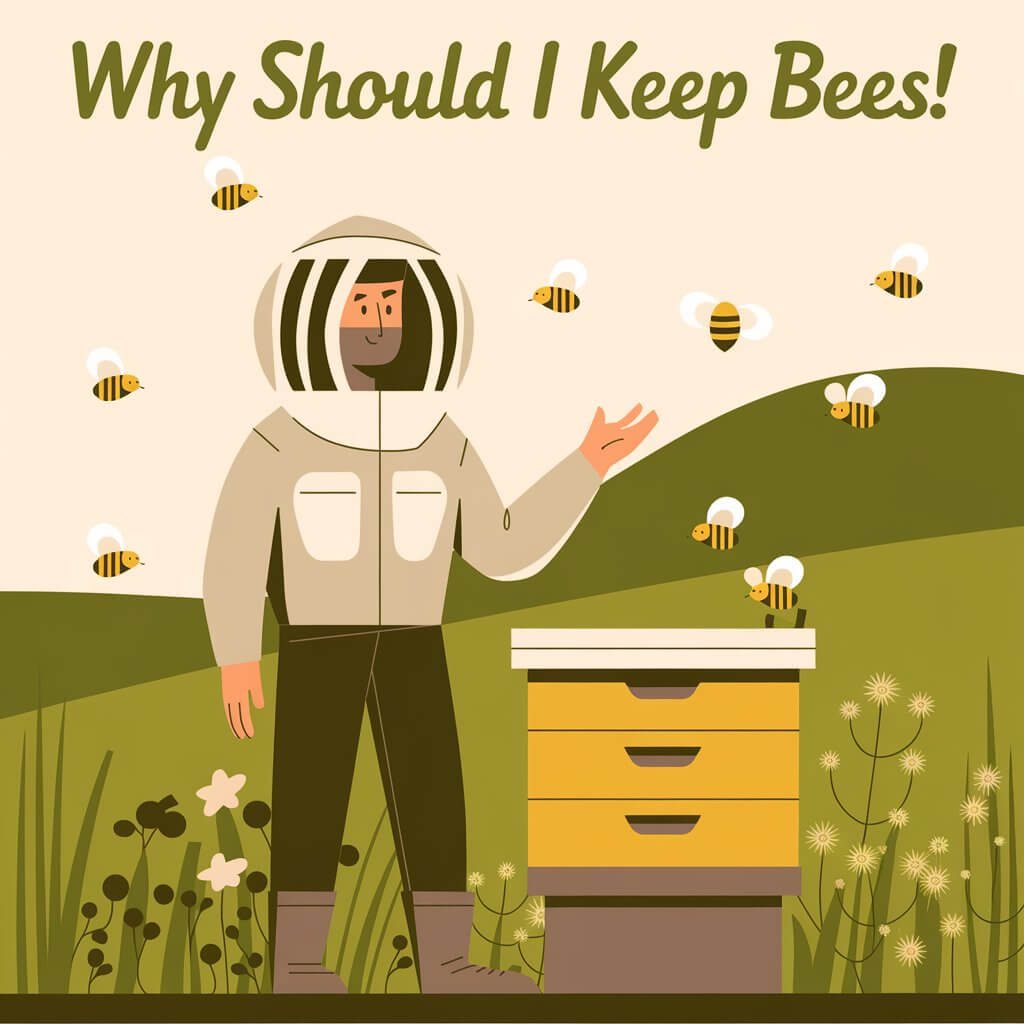Okay, let’s dive into why you might want to become a beekeeper. It’s not just about the honey, though that’s a pretty sweet perk! Keeping bees is like opening a door to a whole new world, a world buzzing with activity, fascinating facts, and a chance to make a real difference. So, let’s explore some of the reasons why beekeeping could be right up your street.
Here’s an podcast on why you might want to keep bees:

A Hobby That Connects You With Nature
For many, beekeeping is a fantastic hobby, a way to get up close and personal with the natural world. Unlike most pets, bees don’t need you to fuss over them constantly. They’re quite happy to get on with their daily lives whether you’re watching or not. You can just chill out, observe them doing their thing, and learn about their complex society. It’s like having a front-row seat to a nature documentary, right in your back garden. The intricate way they communicate with each other, using their bodies and even sounds, is fascinating. Then there’s their amazing ability to navigate using the sun, light, and even landmarks. They even regulate the temperature of their nest with their own built-in heating and cooling system. It’s a never-ending learning experience! You could spend hours watching them and still discover something new.
The time commitment is pretty flexible too. You don’t need to be with your bees every day; just one day in ten is usually enough, with the occasional bit of extra attention during harvest time. And even if you decide not to harvest the honey, you can still get a lot of joy simply by watching the bees go about their business. Some people even like to de-stress by just sitting near the hives and watching the bees coming and going. It’s a great way to switch off from the stresses of daily life and reconnect with nature.
The Sweet Reward: Honey and More
Let’s be honest, one of the main reasons many of us think about beekeeping is the honey. There’s nothing quite like the taste of fresh, raw honey from your own hive. It’s a reward for all your work, and a good way to start with beekeeping, as you can move to other products later. And once you’ve got the hang of it, the bees will be producing honey without too much intervention from you.
But it’s not all about the honey! Bees also produce beeswax, pollen, propolis, and even venom, all of which can be harvested and used. You could end up making your own beeswax candles, or experimenting with propolis for its claimed health benefits. There’s even a market for bee venom, though you may need specialist equipment for harvesting it. It’s like having your own little cottage industry right in your garden. And, if you get good at it, you could even sell some of your products.
Pollination Powerhouses
Beyond the honey and other goodies, honeybees are essential pollinators. They’re vital for plant reproduction and are crucial for the food chain. In fact, it’s estimated that in some countries, 75% of crops rely on bee pollination. As the populations of other pollinating insects decline, the role of honeybees becomes even more critical.
So, by keeping bees, you’re not just getting honey; you’re also doing your bit for the environment and helping to ensure our food security. In some places, farmers depend on bees for pollination, and they are willing to pay for this important service. This could be another opportunity for an experienced beekeeper to earn some money. And that is why governments all over the world have an interest in beekeeping, and spend money on protecting bees.
Supporting Agriculture and the Economy
Beekeeping is more than just a hobby, it’s a multi-billion pound global industry that’s of strategic interest to governments. It’s intertwined with agriculture and the food production chain. Beekeeping is a really important part of agriculture because of its contribution to pollination. And the reduction in the number of commercial beekeepers means that hobbyists are needed more than ever to keep things ticking over. So, if you decide to keep bees you’re also supporting the economy, and helping to put food on the table.
More Than a Hobby: Career Paths in Beekeeping
Beekeeping is also a career option if you are interested. You could be a hobbyist, a bee farmer, run a beekeeping business, or work as a researcher studying bees. There are several career paths you could follow:
• Commercial beekeeping: Manage your own hives, selling honey and other bee products, and maybe even provide pollination services.
• Research: Work in a research institute studying bee behavior, health, and genetics. There are loads of research questions still to be answered.
• Queen breeding: Specialize in raising and selling queen bees to other beekeepers.
• Apitherapy: Use bee venom for therapeutic purposes.
• Education: Share your knowledge and experience by teaching others about beekeeping.
A Relaxing Pastime
For some beekeepers, it’s just a way to de-stress and find some peace. Watching the bees going about their daily activities can be really relaxing. The regular routine of tending the hive can be a therapeutic escape from the fast pace of modern life. There is a comforting sense of calm in the buzzing of the bees.
Challenges to Consider
While beekeeping is rewarding, it’s important to acknowledge the challenges:
• Stings: Yep, you’re going to get stung, it’s pretty much inevitable. But most beekeepers develop a tolerance to it. Wearing protective gear and learning how to handle bees carefully can reduce the risk.
• Time: Bees don’t need you every day, but they do require regular check-ups and maintenance, especially in spring and summer.
• Pests and Diseases: Sadly, bees can suffer from diseases and pests like varroa mites and wax moths. You’ll need to learn how to manage these and keep your colonies healthy.
• Swarming: Bees have a natural instinct to swarm, which means leaving the hive to establish a new colony. You need to manage the hive to prevent this.
• Cost: There are upfront costs, as you need to buy equipment, bees, and protective gear.
So, why should you keep bees? Well, it’s a bit like asking why you should go for a walk in the woods or grow your own tomatoes. It’s a chance to get closer to nature, to learn about the natural world, and to contribute to something bigger than yourself. Beekeeping combines a fascinating hobby, an opportunity to make some honey and other products, and the chance to support the environment and economy. It’s an adventure waiting to happen, full of learning, satisfaction, and a bit of buzzing along the way. And while it’s not without its challenges, the rewards are well worth it. If you’re curious, why not give it a go? You might just find yourself hooked!
